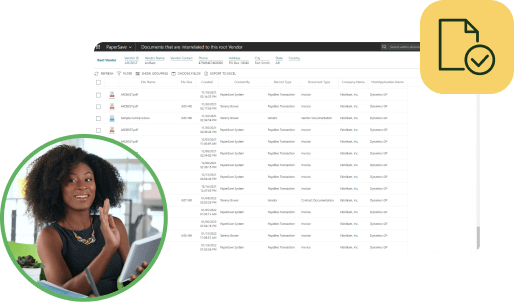Documents and data are the bread and butter of any business, making a document management system all the more important. However, not every Document Management System (DMS) is created equal, so it is always a good idea to evaluate your requirements and align them with the solution you’re considering. With that in mind, here are five important considerations:
#1. Choose a Vendor with Industry Expertise
Although every organization handles documents and records as a central part of its everyday routine, not every business does so in the same way. For example, some businesses, such as those operating in legal or healthcare sectors, need to comply with industry-specific regulations. That’s why it’s imperative that you choose a DMS vendor that understands your industry and the specific challenges it faces.
You’ll most likely want to avoid vendors that claim to offer a cutting-edge solution for virtually any type of organization. It’s important that your DMS can adapt to your needs with a scalable infrastructure and the ability to align with the unique compliance, security and administrative needs of your company.
#2. Look for Appropriate Integration Capabilities
Document management is primarily about organizing and streamlining various everyday administrative tasks. For that reason, there’s not much reason for a system that’s incompatible with your current software. Since the whole point of a DMS is to bring all your documents (both printed and digital) together into a fully integrated platform, you’ll want to choose something with the necessary integration capabilities.
A high-end DMS should work seamlessly with all your core business processes, including customer relationship management and accounting. The goal should be to avoid having to use multiple fragmented systems for data entry to keep everything consistent throughout your organization.
When you find a DMS with tight integrations, you can enjoy significant benefits. Check out this infographic to see just how integrations and automation features can speed up Accounts Payable workflows.
#3. Focus on Collaborative Features
Traditionally, document management took the form of metal filing cabinets containing row upon row of files stored onsite. However, as the workforce becomes increasingly mobile, thanks to the rise of internet-connected smartphones and other devices, it’s now necessary to implement a system that can accommodate users working off-site, too.
By choosing a cloud-hosted DMS with centralized access control, employees should be able to access the files they need for work no matter where they are. This allows, for example, staff to get a head start on the day’s work while they’re at home or even on the commute. Furthermore, powerful collaborative features also enable people to co-author documents in real time and even start video calls in the same window.
#4. Verify Available Support Options
When you have a locally hosted DMS, it will be entirely up to your internal IT team to manage things like access rights, handle software patches and hardware upgrades, and keep the system running smoothly. By choosing a cloud-enabled system, you’ll be able to outsource support and maintenance and have someone to contact whenever you need assistance. At least, that’s the way it should be.
Always look for a vendor with a proven track record of excellent customer support and who is prepared to offer a service-level agreement (SLA) that makes clear their obligation to resolve issues and answer support requests within a given time.
#5. Prioritize Data Security
It’s a common misconception that cloud-based document management is inherently bad for security. But in fact, a reputable cloud vendor will have reached an economy of scale that should allow them to implement measures to protect your data that would be far beyond the financial and human resources of a small business relying only on in-house resources.
Nonetheless, you should always place security at the forefront of every decision your organization makes when it comes to IT. Be sure that any vendor you choose also offers rigorous security using industry-leading and globally recognized standards and protocols. Finally, make sure that their practices are also fully compliant with any regulations specific to your industry.
PairSoft offers a complete document management solution to help you streamline everyday business processes with a centrally managed, cloud-hosed system backed up by cutting-edge security. Want to know more? Watch this video about PairSoft to see if it’s the right fit for your organization.







